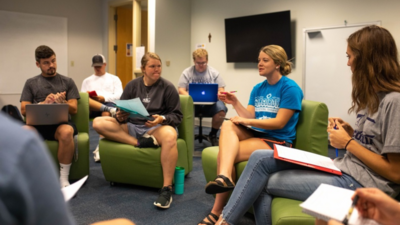Types of Undergraduate Education Degrees at Concordia

For 50 years between 1924 and 1974, Concordia University, Nebraska went by a different name – Concordia Teachers’ College. This name reflected its identity as an institution that trained teachers, and only teachers, until the addition of DCE, pre-seminary and several liberal arts degrees in the mid-1970s.
Despite its modern identity as a university with a wide variety of high-quality degree options, Concordia still excels at preparing future educators for work in private, public and parochial schools after graduation. The undergraduate education programs it offers are unmatched and offer students of all passions and interests the opportunity to receive top-tier training in the educational specialty of their choice.
Four of Concordia’s main education programs are age-level-based; these include early childhood, elementary, middle-level and secondary options. Students who choose to specialize in one of these areas can expect to take a core of required age-specific education courses, such as “Secondary Methods” or “Early Childhood Program Organization and Management” as well as courses that align with content areas of their choosing. Even in the elementary education program, students can choose to focus, or get an “endorsement,” in certain subject areas like general science or art. Content areas only get more specific with older age groups. Secondary education majors, for example, can choose anything from geography to Chinese to physics!
Concordia also offers a few more specific education-major pathways. One of these is special education, which trains its students to teach students with a range of disabilities, creating inclusive and adaptive school environments in their future classrooms. Students’ required courses include basic instruction in educational methods and many courses specific to teaching children with mild to moderate disabilities. Another is the Teaching English to Speakers of Other Languages (TESOL) degree, which prepares non-education majors to instruct English learners in their study of the language.
PK-12, subject-specific education programs also exist within Concordia’s education department. The art education and vocal or instrumental music education programs all enable their graduates to work as instructors of children from preschool through the twelfth grade. Students who choose these programs will take several courses that make up an “educational foundations” core supplementing their many music or art course requirements.
All Concordia education majors will have the opportunity to engage in field experience, a 100-hour classroom time requirement designed to smooth the transition into student teaching and ultimately, a career in education. During their last semester on campus, students will take part in student teaching, or a “professional semester,” during which they will spend eight weeks in a local placement as well as eight weeks in a non-local school placement. These professional experiences allow education students to experience what their future career might look like before they’ve even graduated from college!
Another unique opportunity for education majors at Concordia is the availability of certifications specific to teaching in Lutheran schools (LTD), Christian schools (CTD), or international schools (ITD). Within The Lutheran Church – Missouri Synod, students with an LTD will be rostered church workers eligible to receive a call. Students can also take courses specific to teaching in public schools as an educator professing faith in Christ.
After college, education majors can work in a variety of environments, roles, and pursue a myriad of further opportunities in graduate school or professional development experiences. More information regarding these opportunities can be found here for secondary education and here for elementary education.
Want to receive a unique, Christ-centered training as a future educator? Learn more here.


